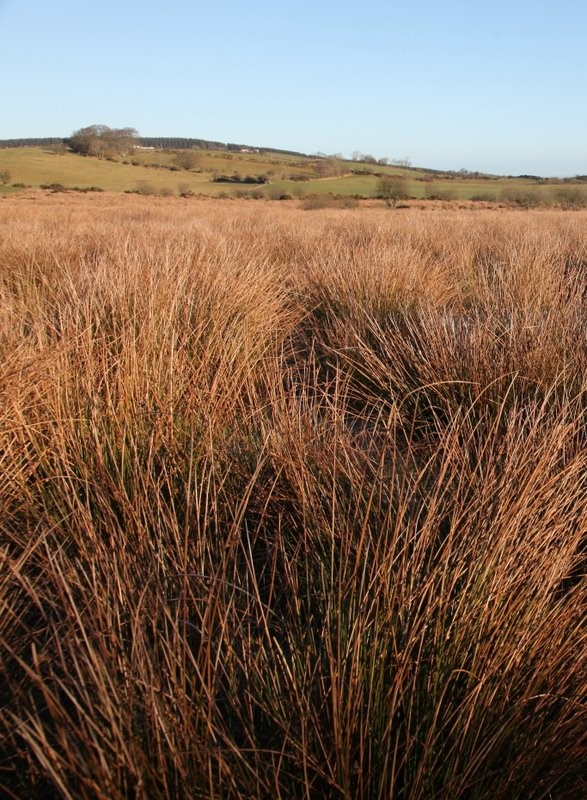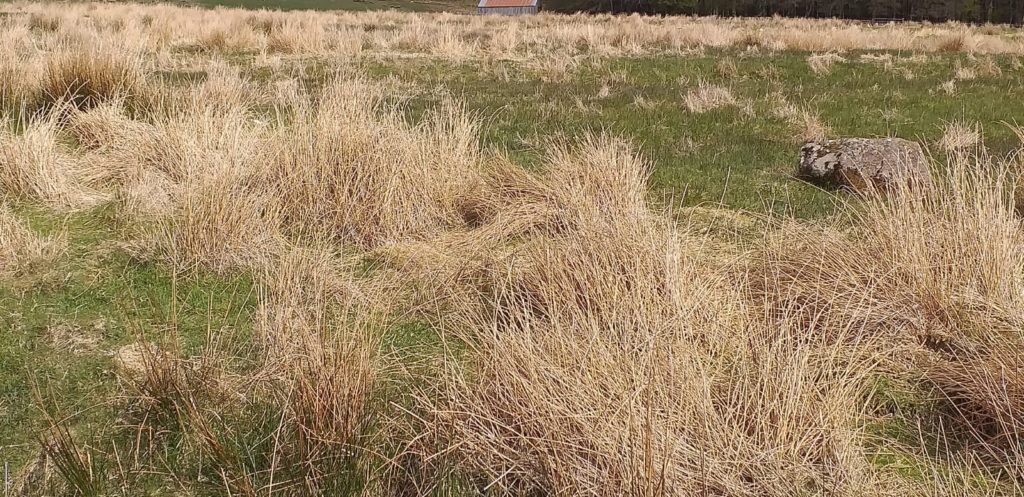
Rush Control
Rush is a competitive, low-nutrient plant which is commonly found in areas of high rainfall with heavy acidic soils. Heavy infestations of rush can damage priority habitats and reduce the quality of grazing and the stock carrying capacity of the land. Rush has traditionally been controlled by either cutting or by treating with the herbicide MCPA.
Water Quality
Currently the majority of pesticide problems at water treatment plants in Northern Ireland are caused by MCPA. This herbicide has been used since the 1950’s to treat broadleaf weeds and rushes in grassland. Unfortunately MCPA is highly mobile in soil water. The graph below shows the average MCPA concentrations in RAW untreated water across the 23 treatment works where water is abstracted by NIW for drinking water provision. As you can see from the graph there is a seasonal trend of spikes which coincides with the spraying season and causes considerable extra cost and risk on the provision of safe drinking water.

Agri-Environment Schemes
Businesses that have joined the Environmental Farming Scheme (EFS) and are Higher agreements holders should note that chemical rush control is not permitted. Rushes should be cut close to the ground, i.e. less than 20 centimetres from ground level, where this does not constitute a Health and Safety risk. The best time for control is early to mid-summer when growth rate of soft rush is highest. Grazing or heavy rolling of the area after cutting will help to reduce regrowth of the rushes.
CAFRE Rush Control Project
In 2014 CAFRE commenced a rush control project that aimed to evaluate the different methods of rush control, to help the industry maintain land as eligible for area based schemes and improve raw water quality.
Project Design
The project was carried out at three longer term sites, based at CAFRE Hill Farm, Glenwherry, Co Antrim, Crom Estate, Newtownbutler, Co Fermanagh and Belfast Hills, Co Antrim. Further sites at Plumbridge, Co. Tyrone; Swatragh, Co. Londonderry and Killeter, Co. Tyrone were used to demonstrate the findings.
At each of these sites five plots of rush were marked out and managed as below:
- Cut only
- Cut and weed wiped with Glyphosate (Roundup Energy)
- Weed wiped with Glyphosate (Roundup Energy)
- Spayed with MCPA
- No cutting or spraying (Control Plot)

Key Findings
- The repeated ‘cutting only’ treatment was only temporarily effective and resulted in an increased rush cover across all sites
- The ‘Cut and Weed Wipe’ resulted in a 50% – 68% reduction in rush cover.
- The ‘Weed Wipe Only’ resulted in a 48% – 65% reduction
- Spraying with MCPA resulted in a 42% – 55% reduction
- Where no intervention occurs, rush cover increased on a year by year basis

The results showed that the most effective rush control was achieved by the application of herbicide either by weed wiping with Glyphosate or boom spraying with MCPA. However, due to the issues being faced by NI Water with MCPA anyone carrying out rush control is strongly encouraged to use weed wiping with Glyphosate where possible. A growing number of contractors now provide this service and glyphosate has been shown to have an effective kill over 5 degree Celsius, allowing application to be delayed into the early winter.
Future Demonstration Sites
CAFRE and NIW will be holding future farmer rush control demonstration sites in the summer of 2021 and beyond. Dates to be confirmed.
Responsible use of pesticides
DAERA has produced a Code of Practice which provides practical advice for users of plant protection products. It explains how you can use pesticides and plant protection products safely and so meet the legal conditions which cover their use.
Rush Control Techniques video and Rush Control webinar
CAFRE has contributed to the recent ‘Source to Tap’ Rush Control Events.
The ‘Source to Tap’ project runs from 2017 to 2022 and is funded by the European Union’s INTERREG VA Programme, the Department of Agriculture, Environment and Rural Affairs (DAERA) in Northern Ireland and the Department for Housing, Planning and Local Government (DHPLG) in Ireland. It is managed by the Special EU Programmes Body (SEUPB).
Source to Tap partners are: Northern Ireland Water, Irish Water, Agri-Food Biosciences Institute, East Border Region, Ulster University and The Rivers Trust.
Rush Control Techniques video:
Rush Control webinar 29 September 2021:
